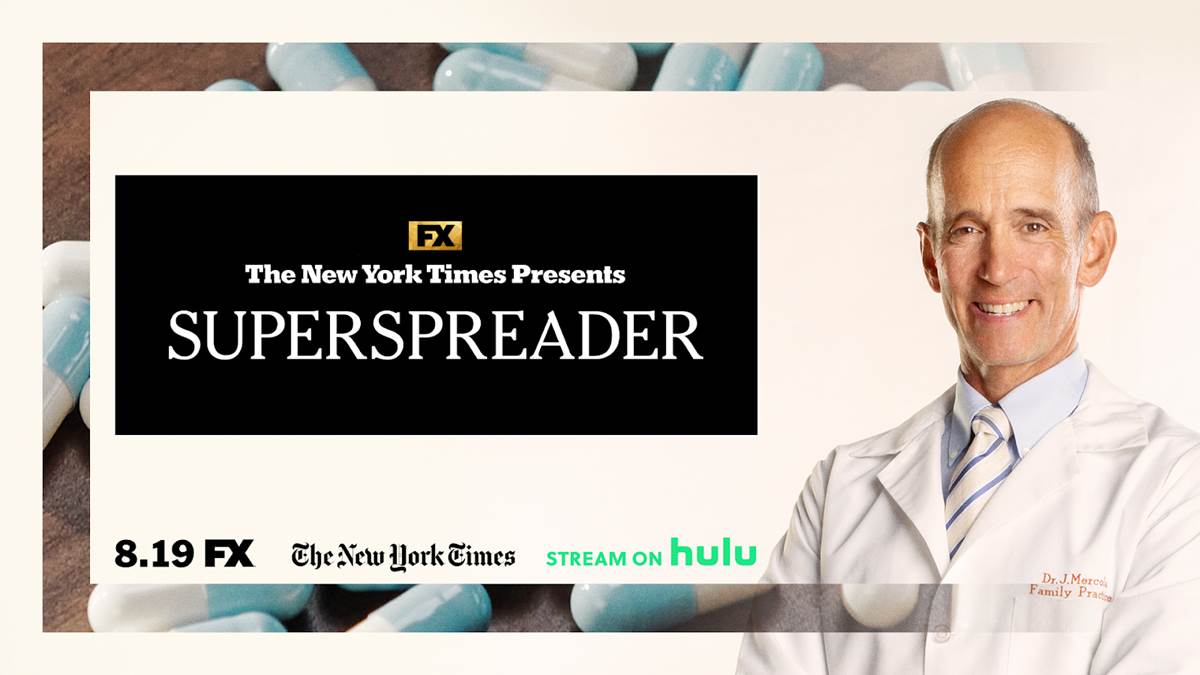News can spread like a virus. In our fast-paced world, it doesn’t take long for either to spread around, which is why it’s so important to get your information from a good source. In the latest installment of the FX series The New York Times Presents, viewers will get a perfect example of this with “Superspreader,” which takes a look at one doctor with a massive following, who is credited as being the top spreader of misinformation regarding the COVID-19 and vaccine in the wellness industry.
To really lay the groundwork for the narrative, reporter Jan Hoffman includes an overview of the rise in distrust towards doctors and the healthcare industry. Tracing it back to the ‘60s when clinical trials were done without the consent of patients, the documentary briefly touches on the start of the anti-vaccination movement. This backstory sets the stage for an opportunist to manipulate a growing audience of people who have reason to not fully trust their healthcare system.
Enter Dr. Joseph Mercola, a Chicago-born M.D. who no longer treats patients, but runs a corporation bearing his name that includes a website that reaches 15 million visitors per month and too many products to list. With the focus of the documentary covering the content he puts into the world, two of the most interesting interviewees are his customers – Sarah Long and Diane Langston. Both women found information and products through Mercola that they believe saved their lives, but both have also veered in different directions. One sees how the Mercola brand has shifted into something overly sensational with claims too outlandish to believe, while the other clings to every word as the gospel truth.
There’s not much in the way of a peek behind the curtain at Mercola’s company, but a character profile is built by two of his medical school classmates and other medical professionals. The closest the documentary comes to an insider speaking out is Steven Spreengo, who previously led content for Mercola’s website and social media accounts. He paints a picture of a team of ghostwriters scouring the internet for buzzy subjects to spin into clickbait, which then gets used to sell products – anything from vitamin supplements bearing the doctor’s name to headphones that allegedly protect you from getting cancer from your smartphone.
We’re still in the midst of a global pandemic and despite easy access to a vaccine in the United States, a significant enough population believes it would cause them more harm than good. One of the pre-credit notes at the end of the documentary states that FDA Commissioner Robert Califf considers misinformation to be the leading cause of death in the country and because of this, another highlight of the film is an interview with Imran Ahmed, CEO of the Center for Encountering Digital Hate who ranked Mercola at the top of “The Disinformation Dozen,” a numbers-based list of the twelve most influential people leading the COVID-19 anti-vaccination effort. We also see how Mercola was de-platformed by several social media companies and how that hasn’t done all that much to stop the spread of misinformation.
At face value, The New York Times Presents “Superspreader” is about Dr. Joseph Mercola, the empire he built, and the people who believe everything he says without question. But what viewers ultimately walk away with is a reminder that if something seems too good to be true, it most surely is.
The New York Times Presents “Superspreader” premieres Friday, August 19th 10 p.m. ET/PT simultaneously on FX and Hulu.

